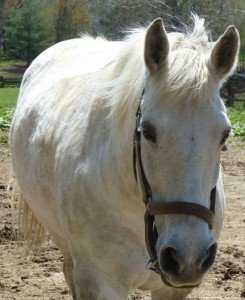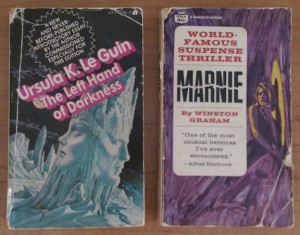In much the same spirit as having a conversation with one’s inner child, I sometimes imagine visiting my younger adult selves. My inner 40-year-old was a bit hard to track down, though, because she had decided to go charging off into battle to right injustice in the world. I finally found her in an imaginary meadow at sunset, with fiery clouds massed on the horizon and shadows lengthening across the muddy path where she was exercising the white horse she planned to ride with the cavalry at dawn.

(photo credit: publicdomainpictures.net)
Dressed in armor like a Valkyrie, she looked down at me from her lofty perch atop the virtual warhorse and spoke, her tone tinged with impatience. “So, you’re supposed to be a future me, or something like that? Got any tips on what’s going to work best to destroy the evil enemy horde?”
“Well, you—that is, we—successfully organized activists on the Internet and ended up as a board member of a nonprofit organization. But that’s not what I came here to talk about.”
Both horse and rider tossed their heads dismissively and went trotting off without further response. After a quick circle around the field, my younger self returned to stare down at me again. “You don’t look much like a warrior. Except maybe your hands,” she observed, noting the calluses on my palms.
“That’s from rowing, actually. Very peaceful—lots of wildlife along the river, herons and otters; if you went out at dawn you’d see beavers.” I dropped the subject of the river when I saw how bored she looked.
“Uh-huh. Well, I’m pretty busy fighting a war here, you know—lots of strategy to plan and details to work out. So unless you’ve got something of practical use to talk about in the here and now, maybe you should just go back to—when was it you came from, anyway?”
“November 2015, and I have one question for you before I go.” Beyond the meadow, a sliver of moon rose above the darkening hills. An owl hooted as I spoke. “What’s the best plan to win a boxing match?”
The horse stamped a hoof impatiently, and my younger self looked as if she’d have liked to do much the same. “Land a knockout blow,” she said absently, with most of her attention on the horse.
“Wrong. Professional boxers never go into a match planning to get a knockout. They conserve their energy and make sure they’ll have enough endurance to go the distance, if necessary.” Around my feet, the tall, swaying grass whispered secrets in the chilly breeze. “Not wasting resources is how you win a war, too. There’s an old saying that goes something like this—recruits talk of glorious battles, ordinary soldiers talk of strategy, and experienced commanders talk of logistics.”
The horse’s flattened ears and bared teeth mirrored the rider’s annoyance as she answered shortly, “Well, I haven’t got much in the way of resources, in case you hadn’t noticed. The enemy are rich, they control the media, and their hateful propaganda is everywhere. My soldiers are full of zeal for the cause, but they’re mainly just peasants with pitchforks. So I have to throw everything I’ve got into the fight—what other choice is there?”
Not far away, a small stream meandered through the field. Little more than a trickle of dark water in the scant moonlight, the stream looked like it would dry up entirely if a few weeks passed without rain.
“See that stream over there?” I raised a hand to gesture toward it. “Doesn’t look like it has much force, does it? But if you followed it down far enough, you’d find that it goes into a broad, strong river and then to the ocean, because that’s the nature of streams—they always flow downhill. In much the same way, stories obey the law of gravity when they’re flowing into the broader culture. Remember that Curious George storybook where instead of delivering newspapers, George made paper boats?”
Although my younger self evidently had no idea what I was getting at, the deep worry lines that creased her brow softened, just a little, at the mention of a favorite old picture book. The horse looked more relaxed as well, letting out a gusty breath that rose as a pale mist in the cooling air.
“You don’t need to fight for control of the river,” I explained. “Let gravity work for you instead. Anything that won’t fit into modern-day culture, such as a newspaper full of senseless old prejudices, naturally sinks of its own weight. Under the murky water, stuck in the mud, it will rot away while the current moves into the future. And those peasants don’t have to go into battle with pitchforks, but instead can fold tiny paper boats to carry their own stories. True stories of real people’s lives may not seem like much; but you’ll find that when enough of them drift down from the little streams where they began their journey, it’s a huge flotilla.”
Now that it had grown too dark for riding, my younger self slid down from the horse’s back and stood holding the reins. Her voice still held some frustration as she answered me. “Well, okay, maybe you can talk about the course of history and all that, and it might even be true, but real people are hurt and angry right now. They want to fight for justice, and I want to channel that energy to make lasting changes in the world.”
“That’s all right. I’m not saying you shouldn’t.” I gave her an encouraging smile and raised a hand in farewell; now that I had made my point, I was ready to go home. “Just be careful to conserve your energy, and that of your activists as well. It won’t do any good to push them so hard that they start collapsing from stress and exhaustion, you know. And as your future self, I’m the one who has to deal with the health effects of your stress, so I would appreciate a little consideration of the fact that the human body has its limits. Get more rest, have some fun, eat healthier foods.”
“You sound just like Mom,” she muttered, as my imaginary self faded out of her time.












